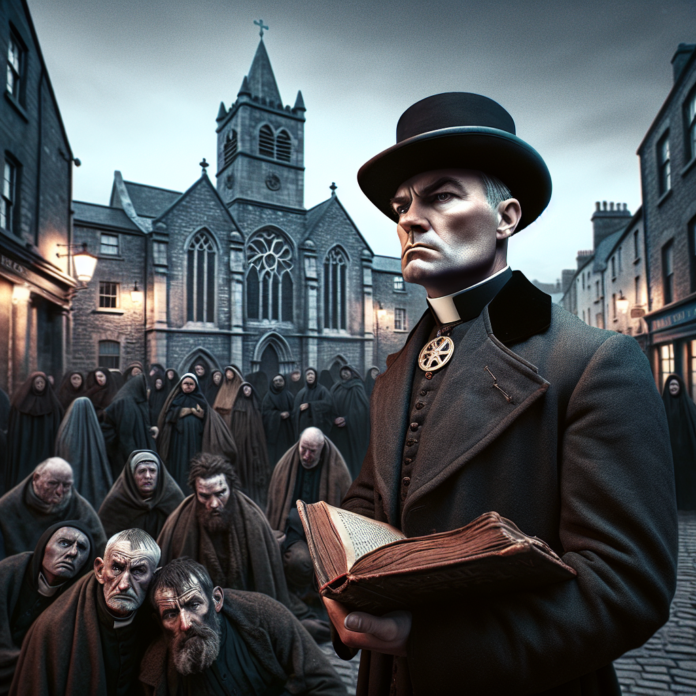In the pantheon of history’s many injustices, Ireland’s Penal Laws stand as a stark testament to the dangers of legislating along the lines of religious dominance and societal control. More than just an era of legal and social oppression, the Penal Laws represented an insidious effort to coerce conformity, with an ironic methodology that saw Protestant rulers enforcing Catholic doctrine indirectly by suppressing it. The peculiar irony of Protestant civil authorities imposing laws that, under a different guise, aimed to maintain their grip on power while simultaneously strangling the lifeblood of Irish Catholicism, reveals a dual-layered tragedy of control and suppression.
The Penal Laws, a series of legislative acts passed from the late 17th century into the 18th century, were designed primarily to disenfranchise the Irish Catholic majority, marginalizing their influence and reducing their socioeconomic power. The scope of these laws was expansive, touching upon every aspect of daily life and systematically eroding the rights of Catholics. They were forbidden from owning land, voting, holding public office, receiving education, practicing their faith openly, and even from marrying Protestants. Each statute was devised to suffocate the social, political, and economic agency of Catholics, ensuring their subservience to the Protestant Ascendancy.
This period must be understood not merely as an exercise in religious oppression, but also through the lens of traditionalism running amok. The Protestant ruling class, keen on preserving their primacy, clung to archaic notions of hierarchical dominance and divine right, while paradoxically implementing measures that mirrored the authoritarian tactics that one might attribute to an overly orthodox Catholic regime.
A central pillar in the structure of these laws was the enforcement of land ownership restrictions. Catholics were prohibited from purchasing land and could only lease it for a term not exceeding thirty-one years, at a rent amounting to no less than two-thirds of its value. The punitive nature of these restrictions not only relegated the Catholic populace to a perpetual state of transience but also stymied economic growth and innovation, demonstrating the self-crippling nature of such traditionalist policies.
Additionally, the Penal Laws severely circumscribed the educational opportunities available to Catholics. The 1695 Act for the Better Suppression of Popery forbade Catholics from running schools and even from sending their children abroad to receive a Catholic education. This educational repression—indicative of a traditionalist desire to maintain rigid social stratifications—resulted in entire generations of Irish Catholics growing up deprived of the intellectual tools needed to challenge their subjugation. The Protestant rulers, in their zealous traditionalism, were blind to the long-term repercussions of a stunted and poorly educated populace, not just for the oppressed, but for the societal progress as a whole.
Marriage laws under the Penal Codes further underline the perverse exploitation of traditional values. Mixed marriages between Catholic women and Protestant men were particularly targeted, as they might bear the risk of converting offspring to Catholicism. A Protestant man married to a Catholic woman faced potential disinheritance. This stifling of personal liberty under the guise of safeguarding social order is a classic hallmark of repressive traditionalism, where the intrinsic human right to choose one’s partner is subjugated for a construed higher moral imperative.
The Penal Laws represent a grim chapter in Irish history, yet, paradoxically, the period became an inadvertent crucible for progressive resistance. The draconian measures, while initially effective, eventually gave rise to a resilient and indomitable spirit of defiance among the oppressed. Institutions such as the “hedge schools,” where Catholic education continued in clandestine defiance of the law, showcased an innovative response to tyranny. These impromptu scholastic gatherings were a beacon of intellectual resistance, challenging the traditionalist paradigm by nurturing the critical and articulate intellects who would later fuel Ireland’s quest for independence.
Moreover, the very extremity of the Penal Laws played a crucial role in galvanizing a more inclusive and forward-looking societal ethos in subsequent years. The Catholic Emancipation movement navigated through and ultimately began to dismantle these archaic statutes by 1829. Progressive figures such as Daniel O’Connell, a towering advocate for Catholic rights, drew upon the collective memory of the Penal Laws’ injustices to unite Catholics and Protestants, fostering a vision of national unity predicated not on division and suppression, but on equality and mutual respect.
In retrospect, the legacy of the Penal Laws starkly illustrates how traditionalist forces, when left unchecked, can lead to systematic exploitation and suppression. Yet, the human spirit’s predilection for resilience against oppression also stands out, underlining an inextinguishable drive towards progressive values. As history has repeatedly shown, any society that seeks to stifle freedom and diversity in the name of maintaining power is inevitably on a path towards self-destruction. The past informs our present, and in remembering the tyranny of the Penal Laws, we are reminded of the necessity to champion progressive ideals, ensuring that the same mistakes are never repeated.
Thus, Ireland’s journey from the shadow of the Penal Laws into the light of a more inclusive society serves not merely as a historical account but as an enduring symbol of the central conflict between regressive traditionalism and the relentless march of progress.
